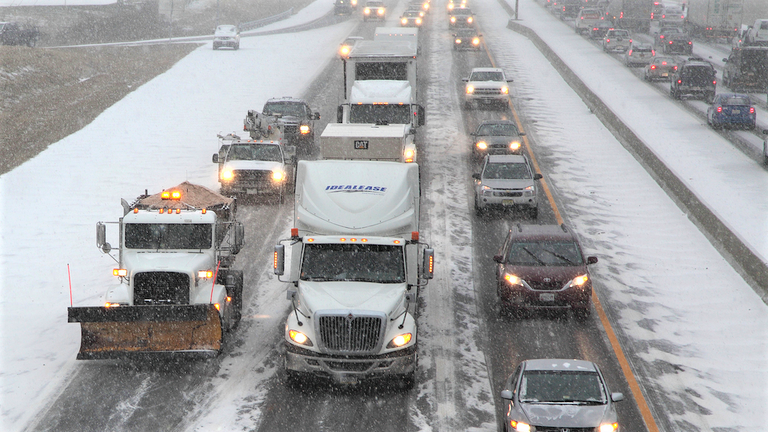Holiday Driving Tips
Holiday events and celebrations can be exciting times for family and friends to get together.
But get-togethers with family and friends can turn into tragedies when people are killed or injured in traffic crashes. As the holiday season is approaching, motorists need to be mindful of actions that will make their holiday travel safer. Drivers can protect themselves and their passengers by following these holiday travel rules. Before you start your trip, make sure your vehicle is tuned up and in good shape for travel. This is especially important for winter driving conditions. Restrain yourself and your passengers properly in seat belts and car safety seats. Remember, the rear seat is the safest place for children of any age to ride. Be flexible in setting your travel plans. Leave early if you can to avoid the peak traffic hours. If snow is predicted during the time you plan to travel, change your schedule. It is better to reschedule your get-together than to risk the lives of traveling family or friends. Stay fresh and alert when driving. Take plenty of breaks and do not push yourself to meet an unrealistic schedule. If you get tired, pull off the road into a rest area or business, get out of the car for some fresh air, buy something to refresh you, or just relax until you feel revived. If that doesn’t work, find a motel or campground where you can spend the night. Forty-one percent of fatal traffic accidents are single-vehicle crashes. These crashes most often occur during the late night/early morning hours and the late afternoon hours to drivers who are tired, have consumed alcohol, or both. Keep your speed down. Give yourself plenty of time and distance to react to the traffic around you. Let impatient and aggressive drivers pass you or go through the intersection ahead of you so that you control the situation. Do not pass if you cannot see enough clear road to pass safely. If there will be drinking at your holiday get-together, choose a designated driver who will remain alcohol-free. Because driving requires your full attention, pull off the road if you must use your cellular phone.
Alcohol, Drivers and the Holidays!
Now is a good time to remind your drivers of the consequences of drinking during the holiday season and what effect their actions can have on their CDL or operator’s license and
ultimately their employment with your company. Advise your drivers to use caution when indulging in alcoholic beverages and to have a designated driver to protect not only their license and job but also the motoring public.
The FMCSA regulations are specific that a CDL driver, while operating any type of motor vehicle, who is convicted of being under the influence of alcohol as described by state law will be disqualified from operating a commercial motor vehicle for one year. A second conviction would disqualify the driver from operating a commercial motor vehicle for life.
When is Alcohol Use Prohibited?
Alcohol is a legal substance; therefore, the rules define specific prohibited alcohol-related conduct. Performance of safety-sensitive functions is prohibited:
-
While using alcohol.
-
While having a breath alcohol concentration of 0.04 percent or greater as indicated by an alcohol breath test.
-
Within four hours after using alcohol.
In addition, refusing to submit to an alcohol test or using alcohol within eight hours after an accident or until tested (for drivers required to be tested) is prohibited.
Cold Weather is Here!
I know we addressed this back in September, but it is worth repeating and reviewing with your drivers again. As I sit here writing this bulletin, it is snowing in Chicago. This week the Midwest
is getting its first dose of measurable snow and below-freezing temperatures. So, it is a good time to review with your drivers how to take care of their fuel during these times.
-
Diesel supplement should be added to ultra-low sulfur diesel fuel when temperatures drop below 32 degrees.
-
If your truck is equipped with an engine block heater, it should be plugged in when the temperature is below 32 degrees. Trucks that are not utilized should be started and left running every day to bring the unit up to normal operating temperature.
-
Initial start-up procedure should be as follows: complete a pre-trip of the unit, unplug the block heater, turn the ignition switch to "on," start the engine, and leave the engine running until operating temperatures increase.
-
For trucks equipped with air brakes, drivers should purge air tanks daily. If the unit is equipped with an air dryer, bringing the PSI to 120 will automatically purge the system.
-
If you are driving in snow, ice, slush, rain, etc., before parking the unit for the day you should lightly apply the brakes while the unit is moving to dry the brake shoes, drums, rotors, and pads so the brakes do not freeze while parked.
-
Make sure windshield washer solvent is full and that all windows are clean.
-
Remove any ice/snow build-up from steps and grab handles to prevent a slip or fall.
When parking the unit, make sure that if heavy snow is forecast, the unit is not left parked in an outside dock or near a building overhang. Snow can drift off the building, causing excessive accumulation on the top.
Fuel Additive Use During Cold Weather Conditions
As colder weather approaches, you need to use fuel additives to prevent fuel gelling. Fuel additive should be added anytime the ambient temperature is below 32 degrees F. Power Service and Penray are popular manufacturers of fuel additives, and both companies have two different products available through Navistar and Idealease locations.
Power Service:
-The "Red Bottle" is Power Service 911 and is to be used only when the fuel in a unit has
gelled and NOT TO BE USED AS A PREVENTATIVE MEASURE TO KEEP FUEL FROM GELLING!
-Power Service Diesel Fuel Supplement + Cetane "White Bottle" is to be added to the fuel at each fill when the ambient temperature is < 32 degrees F.
-This is the additive you should use on a regular basis during the winter months.
Penray:
Winter Thaw Emergency Diesel Fuel Supplement
Dissolves already gelled fuel fast and reduces clogging of fuel filters. Prevents ice crystal build-up in fuel lines and filters by dispersing moisture.
Eliminates hard starting, pounding, excessive smoking and helps improve combustion. 100% compatible with low sulfur fuel and fuel blends.
Here again, Winter Thaw Emergency is ONLY TO BE USED WHEN THE FUEL IS ALREADY GELLED!
Winter Pow-R Plus Diesel Fuel Supplement
ULSD compliant. Prevents gelling of diesel fuel. Prevents ice crystal formation. Reduces cold filter plug point by as much as 30ºF. Helps enhance cetane. Helps improve fuel economy. Utilizes HAFI® technology. Improves cold weather starting. Stabilizes and prevents corrosion. Helps reduce emissions. Helps improve lubricity.
Have you prepared your terminal facility for the long Thanksgiving holiday weekend?
It is not uncommon for thieves to target truck terminals over the holidays as they know it is a good opportunity since no one is there. Make sure that you take extra precautions to secure the trucks and items of value at your terminal. If your units do not have anti-siphon devices or locking caps, instruct the drivers not to fill the units at the end of the day. Make sure that all security alarms and security lighting are in working order. Walk the perimeter of the lot to make sure that security fencing is in good condition. Move units and all other material such as pallets, tires, etc. far enough away from the fence so they cannot be used to climb on to get over the fence. Consider blocking the entrance and exits to the lot so units cannot be stolen. Throughout the four-day weekend, assign management personnel to check the terminal randomly. Using a little prevention and common sense can deter a thief from striking your facility.
There will be no Idealease Safety Bulletin next week, Friday Nov 28th, during the Thanksgiving holiday week. Your next Idealease Safety Bulletin will arrive on December 5th.
Have a Safe and Enjoyable Thanksgiving Holiday with your Family and Friends!









